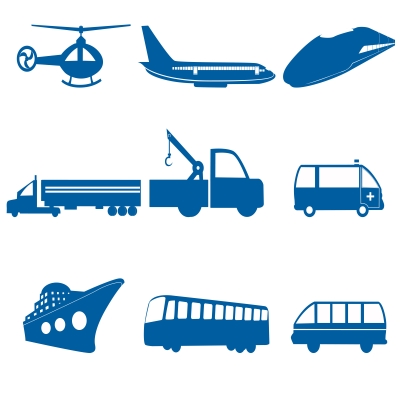- Maritime, aviation and road transportation in areas under National Capital Region (NCR) Plus is operational but will be under capacity restrictions during the enhanced community quarantine from March 29 to April 4
- Vessel and cargo-handling operations and other port-related ancillary services and activities will continue during the ECQ period
- Logistics service providers (delivery and courier services, cargo handling, warehousing, trucking, freight forwarding, port operations and shipping lines) may operate at 100% capacity
- International inbound passenger capacity at Ninoy Aquino International Airport remains limited to a maximum of 1,500 passengers per day
- Airlines may conduct domestic commercial operations but must comply with restrictions on capacity and frequency of flights imposed by local government units outside NCR Plus
- Public utility vehicles, including buses, jeepneys, tricycles, taxis, transport network vehicle services, UV express services and shuttle services, are limited to 50% passenger capacity
Maritime, aviation and road transportation in Metro Manila, Bulacan, Cavite, Rizal and Laguna will remain operational during the enforcement of enhanced community quarantine (ECQ) from March 29 to April 4 but subject to capacity restrictions and other guidelines.
Vessel operations, cargo-handling operations, and other port-related ancillary services and activities will continue during the ECQ period, according to a joint advisory issued by port and maritime authorities on March 28.
Passenger vessels may continue operations at 50% capacity following protocols provided by the Department of Transportation (DOTr) in accordance with Inter-Agency Task Force for the Management of Emerging Infectious Diseases (IATF) Resolution 106-A issued on March 27.
Under the latest IATF omnibus guidelines on implementation of community quarantine in the Philippines, as amended, the only ones allowed to travel on board maritime vessels and to enter government or private ports are the following:
• Health and emergency frontline services personnel
• Government officials and government frontline personnel
• Duly authorized humanitarian assistance actors
• Persons traveling for medical or humanitarian reasons
• Persons going to the airport for travel abroad
• Anyone crossing zones for work or business permitted in the zone of destination, and going back home
• Returning or repatriated overseas Filipino workers and other overseas Filipinos returning to their places of residence
Maritime travel will be subject to requirements to be imposed by local government units (LGU) where voyages originate and end.
All maritime vessels and port facilities must observe stricter adherence to health protocols as well as fully comply with orders from other concerned agencies.
The joint advisory was issued after government announced on March 27 that National Capital Region (NCR) Plus—composed of Metro Manila, Bulacan, Cavite, Rizal, and Laguna—will again be placed under ECQ from March 29 to April 4, 2021 amid the rise of COVID-19 cases in the country.
According to the latest IATF omnibus guidelines dated March 28, public transport )road, rail, maritime and aviation) will be allowed to operate at the capacity set by DOTr and following the protocols provided by the agency.
The movement of cargo/delivery vehicles as well as vehicles used by public utility companies should be unhampered.
Logistics service providers (delivery and courier services, cargo handling, warehousing, trucking, freight forwarding, port operations and shipping lines) are allowed to operate at 100% capacity.
Seaports
In a separate advisory, port operator Asian Terminals Inc. said that in observance of Holy Week, yard, gate, and vessel operations will be temporarily suspended from 7 a.m. of April 2 to 7 a.m. of April 3 at Manila South Harbor Container Terminal Division, Manila South Harbor Stevedoring Division, Batangas Container Terminal, and ATI Batangas Inc. ATI’s Laguna depot will be closed from 5 a.m. of April 2 to 8 a.m. of April 3..
The gates of Manila International Container will also be temporarily closed from 4 a.m. on April 2, while the port will be closed starting 7 a.m. on the same day. Operations will resume at 7 a.m. on April 3.
Air transportation is allowed but at capacities provided by DOTr and in compliance with the agency’s protocols, according to the transport department in a media briefing on March 28.
International inbound passenger capacity at the country’s main gateway, Ninoy Aquino International Airport, will remain limited to a maximum of 1,500 passengers per day.
Domestic commercial operations of airlines will be allowed subject to compliance with requirements or restrictions on capacity and frequency of flights that may be imposed by all LGUs outside NCR Plus.
Airlines must observe the following:
• Strictly implement and adhere to health and safety protocols/measures
• Provide immediate notification of the status of flights to passengers whose flights may be cancelled or postponed
• Strictly adhere to the provisions of the Air Passenger Bill of Rights in case of flight cancellations
Only authorized persons outside of their residence are allowed to travel by air, and departing passengers will be screened by airlines to validate their purpose for travel.
Road transport will remain operational. Public utility vehicles, including bus, jeepneys, tricycles, taxis, transport network vehicle services, UV express services, and shuttle services, are limited to 50% passenger capacity. – Roumina Pablo





